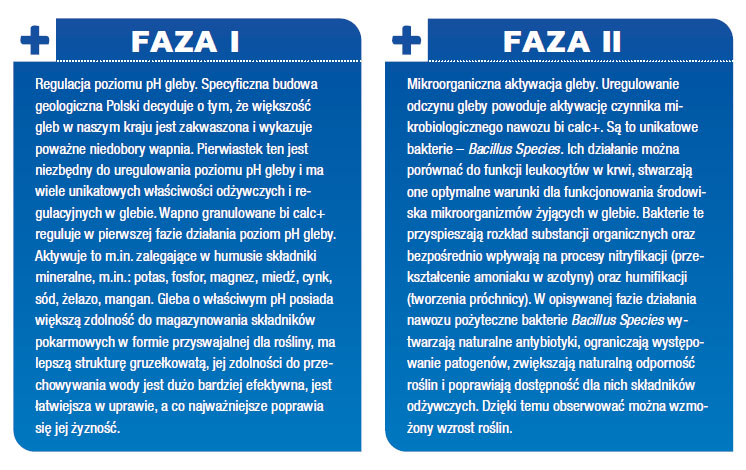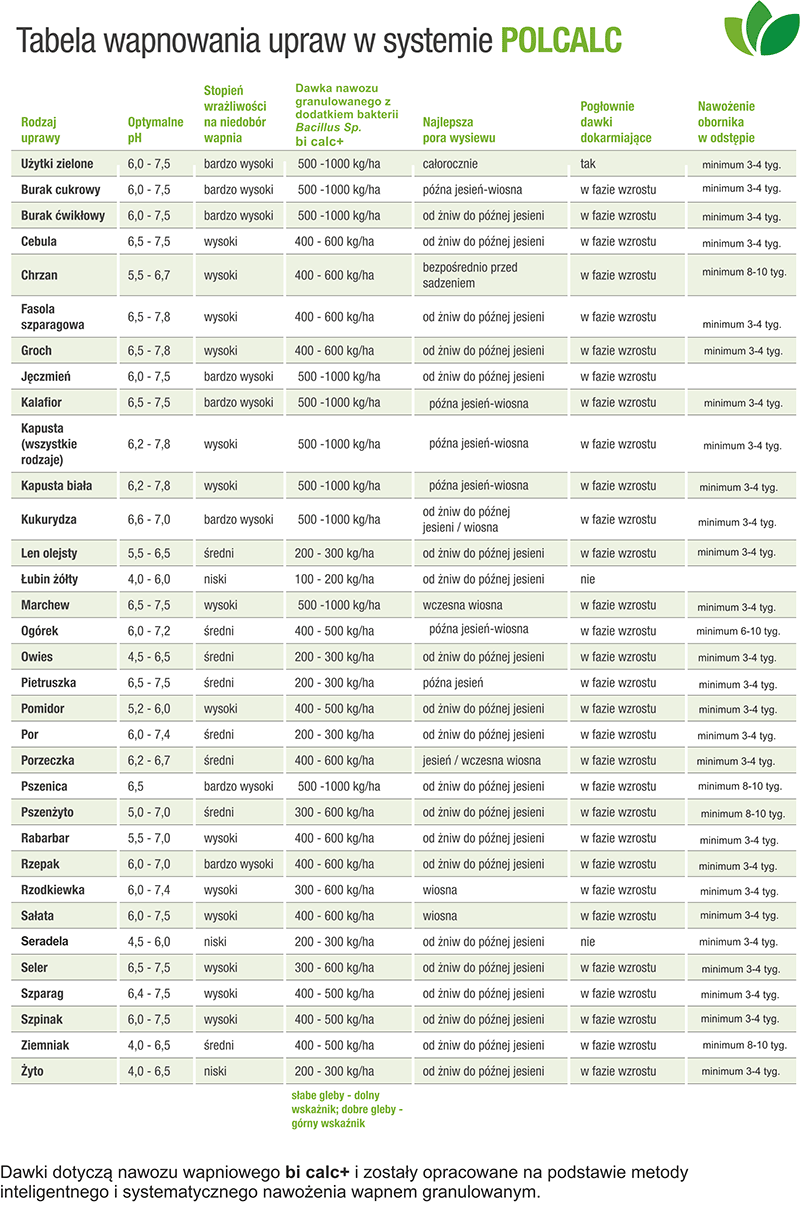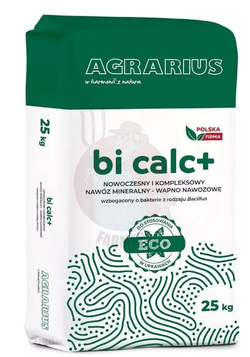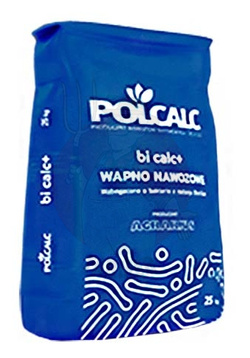- Bi calc+ to wysokoreaktywne granulowane wapno węglanowe z dodatkiem bakterii z rodzaju Bacillus.
- Bi calc+ to dwufazowe wapno nawozowe.
Plonowanie roślin uprawnych w znacznej mierze zależy od zawartości w glebie form przyswajalnych makropierwiastków tj. N, P, K, Mg, Ca i S.
Przy czym decydującą rolę w ich pobraniu przez rośliny ma odczyn gleby warunkowany między innymi zawartością wapnia w glebie. O zawartości wapnia decyduje głównie rodzaj skały macierzystej, z jakiej powstała gleba oraz stopień zaawansowania w niej procesów wietrzenia i przemywania (Juo i Barber 1969, Barber 1995, Wójcik 1998). Najczęściej zwartość wapnia w roztworze glebowym wynosi 200 – 300 mg Ca2+∙dm-3. Przy czym naturalne i związane z działalnością człowieka procesy powodują corocznie straty wapnia w glebie na poziomie co najmniej 140 kg CaO·ha-1. Wspomniane straty tego pierwiastka oraz stosowanie nawozów fizjologicznie kwaśnych powodują zakwaszenie gleb. W glebach o pH 5,0 i niższym zwiększa się mobilność glinu, który powoduje zahamowanie wzrostu korzeni oraz działa fitotoksycznie na włośniki powodując ich zamieranie. Wpływa to niekorzystnie na transport wody i soli mineralnych z roztworu glebowego do części nadziemnych roślin. Rośliny uprawiane na zakwaszonych glebach mają mniejszą odporność na suszę, wymarzanie i porażenie przez choroby i szkodniki. Jedynym skutecznym sposobem regulacji odczynu gleby jest zabieg wapnowania (Kopiński i in. 2013; Krasowicz i in. 2011; Ochal 2012). Decyzję o wyborze wapna nawozowego rolnik powinien podejmować w oparciu o aktualne wyniki badań próbek gleby wykonane między innymi przez OSChR. Należy pamiętać, że na gleby kwaśne o niskiej zawartości magnezu zawsze stosujemy węglanowe wapno magnezowe granulowane SuperMag. Natomiast w przypadku gleb kwaśnych o wysokiej zawartości magnezu stosujemy granulowane wapno węglanowe Polcalc III Generacji.
Od 2020 roku Polcalc Sp. z o.o. wprowadziła do swojej oferty preparat bi calc+. Jest innowacyjne granulowane wapno węglanowe wzbogacone o hiperaktywne szczepy bakterii Bacillus sp. Nawóz produkowany jest z ekstremalnie rozdrobnionej maczki wapiennej (93-98% CaCO3), w której aż 50 % cząstek ma średnicę mniejszą niż 0,02 mm. Stopień rozdrobnienia mączki wpływa na aktywność chemiczną i szybkość rozpuszczenia w środowisku glebowym. Surowiec ten jest przetwarzany w opracowanej przez Polcalc sp. z o.o. innowacyjnej technologii produkcji i granulacji, która umożliwia równomierny wysiew nawozu. Cechą absolutnie innowacyjną jest zawartość w nawozie skoncentrowanej (200×106 JTK w każdym gramie nawozu bi calc+) kultury bakterii Bacillus sp. Mikroorganizmy te przyspieszają procesy rozkładu substancji organicznej na prostsze związki dostępne dla roślin oraz wzmacniają odporność roślin na choroby powodowane przez grzyby i bakterie. Dzięki wapnowaniu nawozem bi calc+ intensywniej przebiega proces pobierania azotu z powietrza przez mikroorganizmy zarówno wolno żyjące, jak i symbiotyczne bakterie korzeniowe u roślin motylkowych. Dodanie do wapna bi calc+ nowej generacji substancji humusowych jako pożywki dla bakterii z rodzaju Bacillus sp. utrzymuje ich właściwy poziom namnażania, co powoduje wzrost przyswajalności składników pokarmowych z gleby o 20-40%. Dodatkowo wapno bi calc+ stymuluje rozwój korzeni u roślin uprawnych, co przyczynia się do lepszego pobrania składników odżywczych i w końcowym efekcie do wzrostu ich plonowania. Granulowane wapno węglanowe bi calc+ jest całkowicie bezpiecznym nawozem zarówno dla zwierząt, roślin jak i organizmów glebowych. Można je stosować od wiosny do późnej jesieni w dawce 500-1000 kg·ha-1w zależności od odczynu i rodzaju gleby. Nawozu nie należy stosować bezpośrednio przed i po aplikacji nawozów mineralnych zawierających fosfor oraz azot w formie amonowej czy amidowej, a także nawozów naturalnych: obornika, gnojówki, gnojowicy. Zalecana przerwa między tymi zabiegami wynosi co najmniej 3-4 tygodnie.
Produkt łączy zalety klasycznego nawozu Polcalc III Generacji z bogatą zawartością aktywnych bakterii stymulujących procesy humifikacji (tworzenie humusu) i nitryfikacji.
Bi calc+ to dwufazowe wapno nawozowe










